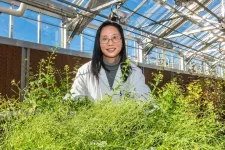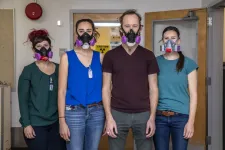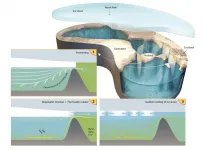(Press-News.org) BOSTON - Although abnormal blood clotting has been identified as one of the primary causes of death from COVID-19, early treatment in an intensive care unit (ICU) with therapeutic anticoagulation (anti-clotting) for adults who are critically ill with COVID-19 does not appear to improve chances of survival, and could do more harm than good by increasing the risk for major bleeding, a multicenter research group cautions.
"In patients critically ill with COVID-19, therapeutic dose anticoagulation started early in the ICU stay was not associated with improved survival,"says Hanny Al-Samkari, MD, an investigator in the Division of Hematology/Oncology at Massachusetts General Hospital (MGH) and lead author of a study reporting the findings in the journal END
Preventive anti-clotting therapy does not boost survival of critically ill COVID patients
Among 3,239 critically ill adults with COVID-19, early use of therapeutic anticoagulation in the intensive care unit did not reduce the risk of death, an observational study found
2021-02-03
ELSE PRESS RELEASES FROM THIS DATE:
Most vulnerable often overlooked in clinical trials of new treatments for COVID-19
2021-02-03
Studies examining the effectiveness of treatments for COVID-19 often do not include the very populations hardest hit by the disease, according to a new review by University of Chicago Medicine researchers.
The findings, based on an analysis of all US COVID-19 treatment trials registered on ClinicalTrials.gov, were published Jan. 27 in the Journal of General Internal Medicine.
"This study highlights the blind spot in how clinical trials are done in the United States," said senior author Neda Laiteerapong, MD, MS, a general internist and associate director of the Center for Chronic Disease Research and Policy at the University of Chicago. "Researchers, hospitals and pharmaceutical ...
Scientists discover plants' roadblock to specialty oil production
2021-02-03
UPTON, NY - Hundreds of naturally occurring specialty fatty acids (building blocks of oils) have potential for use as raw materials for making lubricants, plastics, pharmaceuticals, and more--if they could be produced at large scale by crop plants. But attempts to put genes for making these specialty building blocks into crops have had the opposite effect: Seeds from plants with genes added to make specialty fatty acids accumulated dramatically less oil. No one knew why.
Now two teams of biochemists working on separate aspects of oil synthesis at the U.S. Department of Energy's Brookhaven National Laboratory have converged to discover the mechanism behind the oil-production slowdown. As described in the journal Plant Physiology, they crossbred model plants and conducted detailed ...
Moffitt researchers discover mechanism that regulates anti-tumor activity of immune cells
2021-02-03
TAMPA, Fla. -- The prognosis of ovarian cancer is poor, with an estimated five-year survival of only 40% for advanced disease, the stage at which most ovarian carcinomas are diagnosed. These poor outcomes are partly due to the lack of effective therapies for advanced disease and recurrence. Immunotherapies hold promise for many types of cancer; however, studies have shown that patients with ovarian cancer do not have strong responses to existing drugs. In a new article published in Nature, Moffitt Cancer Center researchers demonstrate why some ...
Minority patients miss out on cystic fibrosis drugs due to genetic test limitations
2021-02-03
There is an impassioned debate taking place in medicine on whether race-based considerations should be a factor in research, diagnoses, or treatments. Those on one side assert that race should be ignored entirely because it is a societal construct with no biological basis, and accordingly many hospitals are abandoning long-established "race corrections" in medical algorithms and diagnostics. Others, like Meghan McGarry, MD, MS, assistant professor of pediatrics at UC San Francisco, say that we can't completely ignore race, precisely because science is rarely free of societal influence - the structural inequality ...
Discoveries at the edge of the periodic table: first ever measurements of einsteinium
2021-02-03
Since element 99 - einsteinium - was discovered in 1952 at the Department of Energy's Lawrence Berkeley National Laboratory (Berkeley Lab) from the debris of the first hydrogen bomb, scientists have performed very few experiments with it because it is so hard to create and is exceptionally radioactive. A team of Berkeley Lab chemists has overcome these obstacles to report the first study characterizing some of its properties, opening the door to a better understanding of the remaining transuranic elements of the actinide series.
Published in the journal Nature, the study, "Structural and Spectroscopic Characterization of an Einsteinium Complex," was co-led by Berkeley Lab scientist Rebecca Abergel and Los ...
The Arctic Ocean was covered by a shelf ice and filled with freshwater
2021-02-03
The Arctic Ocean was covered by up to 900 m thick shelf ice and was filled entirely with freshwater at least twice in the last 150,000 years. This surprising finding, reported in the latest issue of the journal Nature, is the result of long-term research by scientists from the Alfred Wegener Institute and the MARUM. With a detailed analysis of the composition of marine deposits, the scientists could demonstrate that the Arctic Ocean as well as the Nordic Seas did not contain sea-salt in at least two glacial periods. Instead, these oceans were filled with large amounts of freshwater under a thick ice shield. This water could then be released into the North Atlantic in very short periods of time. Such sudden freshwater inputs could explain rapid climate oscillations for which no satisfying ...
Emergency department visits for mental health, overdose and violence before, during COVID-19 pandemic
2021-02-03
What The Study Did: Data from the Centers for Disease Control and Prevention were used to look at changes in emergency department visits for mental health, suicide attempts, drug and opioid overdoses and outcomes of violence before and during the COVID-19 pandemic.
Authors: Kristin M. Holland, Ph.D., M.P.H., of the Centers for Disease Control and Prevention in Atlanta, is the corresponding author.
To access the embargoed study: Visit our For The Media website at this link https://media.jamanetwork.com/
(10.1001/jamapsychiatry.2020.4402)
Editor's Note: Please see the article for additional information, ...
COVID-19 outcomes among individuals living with, without HIV in New York State
2021-02-03
What The Study Did: COVID-19 outcomes including hospitalization and in-hospital death were compared between people living with or without diagnosed HIV in New York State.
Authors: Eli S. Rosenberg, Ph.D., of the State University of New York in Rensselaer, is the corresponding author.
To access the embargoed study: Visit our For The Media website at this link https://media.jamanetwork.com/
(doi:10.1001/jamanetworkopen.2020.37069)
Editor's Note: The article includes conflict of interest and funding/support disclosures. Please see the article for additional information, including other authors, author contributions and ...
Soil bacteria hormone discovery provides fertile ground for new antibiotics
2021-02-03
Mechanism for control of antibiotic production in soil bacteria is visualised for the first time by scientists at University of Warwick and Monash University
Research reported in Nature could lead to improved manufacturing of existing antibiotics, and open up opportunities to discover new ones
The majority of clinically used antibiotics are derived from soil bacteria, but can be hard to find because their production is switched off in laboratory cultures
The discovery of how hormone-like molecules turn on antibiotic production in soil bacteria could unlock the untapped opportunities for medicines that are under our very feet.
An international team of scientists working at the University of Warwick, UK, and Monash ...
Personalized screening to identify teens with high suicide risk
2021-02-03
ANN ARBOR, Mich. - The suicide rate among American adolescents has rose drastically over the last decade, but many at-risk youths aren't receiving the mental health services they need.
In fact, one of the greatest challenges is identifying the young people who need the most help.
Now, researchers have developed a personalized system to better detect suicidal youths. The novel, universal screening tool helps caregivers reliably predict an adolescent's suicide risk - alerting them to which ones need follow-up interventions - according to Michigan Medicine-led findings published in JAMA Psychiatry.
"Too many young people are dying by suicide and many at high risk go completely unrecognized and untreated," says lead author Cheryl King, Ph.D., ...
LAST 30 PRESS RELEASES:
Trapping light on thermal photodetectors shatters speed records
New review highlights the future of tubular solid oxide fuel cells for clean energy systems
Pig farm ammonia pollution may indirectly accelerate climate warming, new study finds
Modified biochar helps compost retain nitrogen and build richer soil organic matter
First gene regulation clinical trials for epilepsy show promising results
Life-changing drug identified for children with rare epilepsy
Husker researchers collaborate to explore fear of spiders
Mayo Clinic researchers discover hidden brain map that may improve epilepsy care
NYCST announces Round 2 Awards for space technology projects
How the Dobbs decision and abortion restrictions changed where medical students apply to residency programs
Microwave frying can help lower oil content for healthier French fries
In MS, wearable sensors may help identify people at risk of worsening disability
Study: Football associated with nearly one in five brain injuries in youth sports
Machine-learning immune-system analysis study may hold clues to personalized medicine
A promising potential therapeutic strategy for Rett syndrome
How time changes impact public sentiment in the U.S.
Analysis of charred food in pot reveals that prehistoric Europeans had surprisingly complex cuisines
As a whole, LGB+ workers in the NHS do not experience pay gaps compared to their heterosexual colleagues
How cocaine rewires the brain to drive relapse
Mosquito monitoring through sound - implications for AI species recognition
UCLA researchers engineer CAR-T cells to target hard-to-treat solid tumors
New study reveals asynchronous land–ocean responses to ancient ocean anoxia
Ctenophore research points to earlier origins of brain-like structures
Tibet ASγ experiment sheds new light on cosmic rays acceleration and propagation in Milky Way
AI-based liquid biopsy may detect liver fibrosis, cirrhosis and chronic disease signals
Hope for Rett syndrome: New research may unlock treatment pathway for rare disorder with no cure
How some skills become second nature
SFU study sheds light on clotting risks for female astronauts
UC Irvine chemists shed light on how age-related cataracts may begin
Machine learning reveals Raman signatures of liquid-like ion conduction in solid electrolytes
[Press-News.org] Preventive anti-clotting therapy does not boost survival of critically ill COVID patientsAmong 3,239 critically ill adults with COVID-19, early use of therapeutic anticoagulation in the intensive care unit did not reduce the risk of death, an observational study found



